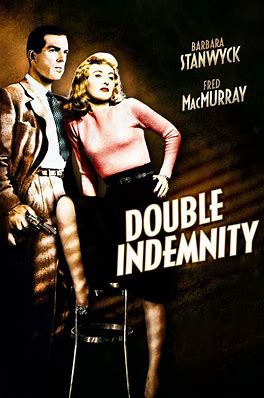A Feminist Film Perspective on Gone Girl (2014) and Double Indemnity (1944)
From a feminist perspective, both Gone Girl (2014) and Double Indemnity (1944) explore women’s manipulation of men, but they do so in ways that reflect different social expectations and gender dynamics and norms. Double Indemnity, a classic film noir, features Phyllis Dietrichson as the typical femme fatale. Phyllis uses her sexuality and cunning nature to manipulate Walter Neff into a murder plot, embodying the post-WWII fears of women’s increasing independence and sexual power. Ultimately, her punishment for this reinforces the idea that women who defy traditional roles must be punished.
In contrast, Gone Girl presents a more contemporary feminist critique. Amy Dunne also manipulates her husband, but her motivations are more complex, driven by societal pressures to conform to the ideal of the perfect wife, plus a need for revenge for his infidelity. Amy’s plot to frame Nick for her murder critiques the performative nature of gender roles in marriage. Unlike Phyllis, Amy’s manipulation goes beyond sexual allure—she controls the media, the legal system, and her narrative, offering a chilling commentary on power dynamics within modern relationships.
While both films depict women who use their intelligence to control men, Gone Girl explores more modern forms of agency, where women manipulate not just through physicality, but through intellect and strategic control. Phyllis, by contrast, represents a more traditional, sexually driven form of female power that ultimately leads to her downfall. Thus, while Double Indemnity reflects post-war anxieties about women’s growing autonomy, Gone Girl offers a more nuanced exploration of gender, power, and manipulation in the contemporary world.
Sources:
A Feminist Film Perspective on Gone Girl (2014) and Double Indemnity (1944)
From a feminist perspective, both Gone Girl (2014) and Double Indemnity (1944) explore women’s manipulation of men, but they do so in ways that reflect different societal contexts and gender dynamics. Double Indemnity, a classic film noir, features Phyllis Dietrichson (Barbara Stanwyck) as the femme fatale. Phyllis uses her sexuality and cunning to manipulate Walter Neff (Fred MacMurray) into a murder plot, embodying the post-WWII fears of women’s increasing independence and sexual power. Ultimately, her punishment for this transgression reinforces the idea that women who defy traditional roles must be punished.
In contrast, Gone Girl presents a more contemporary feminist critique. Amy Dunne (Rosamund Pike) also manipulates her husband, Nick (Ben Affleck), but her motivations are more complex, driven by societal pressures to conform to the ideal of the perfect wife. Amy’s plot to frame Nick for her murder critiques the performative nature of gender roles in marriage. Unlike Phyllis, Amy’s manipulation goes beyond sexual allure—she controls the media, the legal system, and her narrative, offering a chilling commentary on power dynamics within modern relationships.
While both films depict women who use their intelligence to control men, Gone Girl explores more modern forms of agency, where women manipulate not just through physicality, but through intellect and strategic control. Phyllis, by contrast, represents a more traditional, sexually driven form of female power that ultimately leads to her downfall. Thus, while Double Indemnity reflects post-war anxieties about women’s growing autonomy, Gone Girl offers a more nuanced exploration of gender, power, and manipulation in the contemporary world.
Sources:
A Feminist Film Perspective on Gone Girl (2014) and Double Indemnity (1944)
From a feminist perspective, both Gone Girl (2014) and Double Indemnity (1944) explore women’s manipulation of men, but they do so in ways that reflect different societal contexts and gender dynamics. Double Indemnity, a classic film noir, features Phyllis Dietrichson (Barbara Stanwyck) as the femme fatale. Phyllis uses her sexuality and cunning to manipulate Walter Neff (Fred MacMurray) into a murder plot, embodying the post-WWII fears of women’s increasing independence and sexual power. Ultimately, her punishment for this transgression reinforces the idea that women who defy traditional roles must be punished.
In contrast, Gone Girl presents a more contemporary feminist critique. Amy Dunne (Rosamund Pike) also manipulates her husband, Nick (Ben Affleck), but her motivations are more complex, driven by societal pressures to conform to the ideal of the perfect wife. Amy’s plot to frame Nick for her murder critiques the performative nature of gender roles in marriage. Unlike Phyllis, Amy’s manipulation goes beyond sexual allure—she controls the media, the legal system, and her narrative, offering a chilling commentary on power dynamics within modern relationships.
While both films depict women who use their intelligence to control men, Gone Girl explores more modern forms of agency, where women manipulate not just through physicality, but through intellect and strategic control. Phyllis, by contrast, represents a more traditional, sexually driven form of female power that ultimately leads to her downfall. Thus, while Double Indemnity reflects post-war anxieties about women’s growing autonomy, Gone Girl offers a more nuanced exploration of gender, power, and manipulation in the contemporary world.
Sources:
https://moodle.tru.ca/mod/resource/view.php?id=2688369
http://eprints.undip.ac.id/65373/1/Skripsi_Irene_Heni_13020114130064.pdf
https://orca.cardiff.ac.uk/id/eprint/154954/1/Rosie%20Couch%20-%20Thesis%20%28Corrected%29%20FINAL%20VERSION.pdf

Provide Feedback